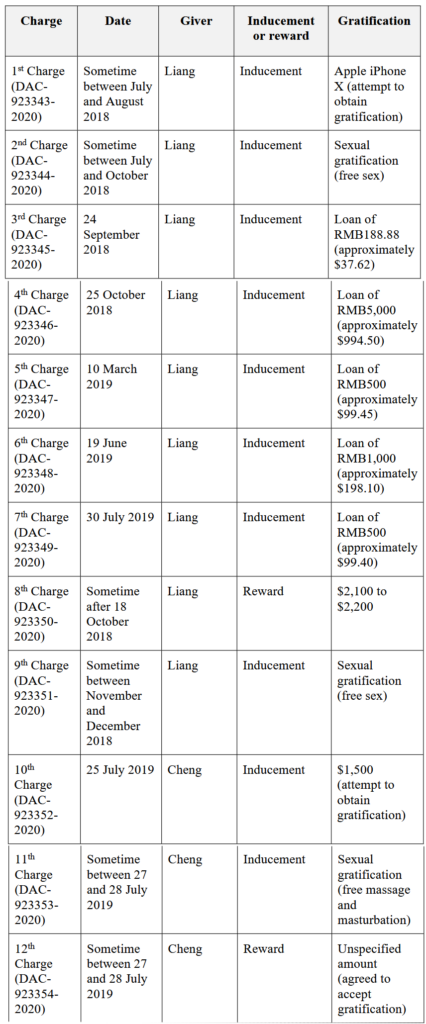In a judgment delivered on 14 April 2025, the General Division of the High Court upheld former ICA officer Teo Hwee Peng’s convictions on eight charges of corruption and allowed the prosecution’s appeal against his acquittals on three further charges.
Justice Vincent Hoong, presiding over the appeals, found that the trial judge had not erred in convicting Teo on the initial eight charges under section 6(a) of the Prevention of Corruption Act (PCA), and held that the trial judge’s acquittal of Teo on the 10th to 12th charges was incorrect. The court also deferred sentencing on the newly reinstated convictions to a later date.
According to the judgment, Teo, a former Checkpoints Inspector 2 at the Immigration & Checkpoints Authority (ICA), was charged with soliciting and receiving gratification between July 2018 and July 2019 from two individuals—Liang Qinglan and Cheng Wenjuan—in exchange for purportedly helping them obtain Special Passes to remain in Singapore.
The court noted that Liang and Cheng were Chinese nationals who had entered Singapore on Social Visit Passes and subsequently overstayed. Liang, arrested in October 2018, was granted a Special Pass shortly after, and Cheng, arrested in May 2019, received similar treatment.
Teo was initially convicted at trial on eight charges involving Liang, including solicitation of an iPhone, sexual services, and various loans. He was acquitted on four remaining charges related to Cheng, including solicitation of money and sexual gratification.
He was sentenced to 33 months’ imprisonment and a penalty of S$2,634.57, with five weeks’ imprisonment in default.
On appeal, the High Court found no reason to disturb the conviction on the first eight charges. Justice Hoong affirmed the trial judge’s finding that Liang’s evidence was “cogent and credible”, noting her consistent testimony and lack of motive to falsely implicate Teo.
He cited the trial judge’s assessment that Liang, who had already served a sentence for her own related offences, had “no reason to falsely implicate Teo”, and that her evidence was corroborated by WeChat messages extracted from Teo’s phone and aspects of Teo’s own testimony.
Justice Hoong also endorsed the trial judge’s finding that Teo had coached Liang on how to answer ICA officers’ questions to obtain a Special Pass and had received cash from her instead of an iPhone, suggesting a shift intended to reduce the evidential trace of his actions.
The court rejected Teo’s assertion that his interactions with Liang were motivated by efforts to cultivate her as an informant, noting that he lacked authorisation to handle informants and that this justification emerged only in later statements to CPIB investigators.
On the presumption of corruption under section 8 of the PCA, Justice Hoong agreed with the trial judge that it applied to Teo’s receipt of loans and sexual favours from Liang and that Teo had failed to rebut this presumption.
He noted that the trial judge had rightly found the relationship between Teo and Liang to be “purely transactional”, making the alleged gifts and loans suspect.
As to the prosecution’s appeal, the High Court found that the trial judge erred in giving insufficient weight to the evidence related to Cheng.
Although Cheng had died by suicide in August 2021 and was unable to testify at trial, the court found that her statements to the CPIB, recorded before her death, were admissible and corroborated by Liang’s evidence.
Justice Hoong disagreed with the trial judge’s characterisation of Liang’s testimony as hearsay in respect of the 10th to 12th charges, noting that Liang’s recounting of what Teo had told her about Cheng’s case constituted direct evidence. The court also noted that WeChat logs confirmed Liang had discussed Cheng’s situation with Teo.
The judgment further observed that Teo’s actions—such as facilitating Cheng’s arrest and expressing willingness to assist her immigration situation—mirrored the pattern of his conduct with Liang. This, according to the court, supported the prosecution’s claim that Teo had a corrupt arrangement with Cheng.
The High Court also dismissed Teo’s argument that his attempted solicitation of an iPhone (1st charge) and his eventual receipt of cash (8th charge) constituted duplicative offences. Justice Hoong distinguished the two by noting differences in the nature of the gratification and intent, ruling that both charges could stand independently.
This case, as noted by the court, highlights the importance of safeguarding public trust in law enforcement agencies. Teo’s misuse of his position to exploit vulnerable overstayers for personal gain was found to be incompatible with the responsibilities entrusted to public officers.
The court’s detailed written grounds now pave the way for the sentencing of Teo on the reinstated charges.

The post Former ICA officer convicted of corruption charges, acquittals overturned on appeal appeared first on The Online Citizen.


